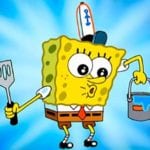 Weird Stuff
Weird Stuff  Weird Stuff
Weird Stuff  Health
Health Ten Confounding New Inventions from the World of Biomedicine
 Creepy
Creepy 10 Death Superstitions That Will Give You the Creeps
 Movies and TV
Movies and TV 10 Movies That Get Elite Jobs Right, According to Experts
 Weird Stuff
Weird Stuff 10 Times Real Laws Were Based on Bizarre Hypotheticals
 Animals
Animals 10 Inspiring Tales of Horses Being Human
 Mysteries
Mysteries Top 10 Haunting Facts About the Ghost Ship MV Alta
 History
History 10 Surprising Stories About the Texas Rangers
 Humans
Humans 10 Philosophers Who Were Driven Mad by Their Own Theories
 Miscellaneous
Miscellaneous 10 Video-Game-Worthy Weapons and Armors from History
 Weird Stuff
Weird Stuff 10 Warning Labels That Exist Because Someone Actually Tried It
 Health
Health Ten Confounding New Inventions from the World of Biomedicine
 Creepy
Creepy 10 Death Superstitions That Will Give You the Creeps
Who's Behind Listverse?

Jamie Frater
Head Editor
Jamie founded Listverse due to an insatiable desire to share fascinating, obscure, and bizarre facts. He has been a guest speaker on numerous national radio and television stations and is a five time published author.
More About Us Movies and TV
Movies and TV 10 Movies That Get Elite Jobs Right, According to Experts
 Weird Stuff
Weird Stuff 10 Times Real Laws Were Based on Bizarre Hypotheticals
 Animals
Animals 10 Inspiring Tales of Horses Being Human
 Mysteries
Mysteries Top 10 Haunting Facts About the Ghost Ship MV Alta
 History
History 10 Surprising Stories About the Texas Rangers
 Humans
Humans 10 Philosophers Who Were Driven Mad by Their Own Theories
 Miscellaneous
Miscellaneous 10 Video-Game-Worthy Weapons and Armors from History
Top 10 Coolest Slang Terms and Phrases from around the World
The edges of any language are ragged, torn, messy, and not easily delineated from the next fluttering language. This is the place you’ll find slang—an ever-shifting series of terms, words, phrases, and grammatical quirks that, depending on your perspective, either debase, oversimplify, and cheapen a language or provide it with the color and joy that aids in keeping the given language from becoming overly rigid and utilitarian.
Here’s a list of some of the weirdest, coolest, and most obscure terms used on the streets; in the cantinas, the pubs, and coffee houses; on the farms and the decks of fishing boats; and rarely, if ever, in the halls of academia or on the pages of textbooks.
Related: 10 Foreign Words That Deserve English Translations
10 Sigogglin – Appalachian English, USA
Appalachian dialects are old, perhaps the oldest English language dialects in the continental U.S. What is amazing is that there are still many people who speak this way, allowing terms that are entirely alien to most English speakers to live alongside the modern, everyday language (primarily the broader Southern U.S. dialect). The thing about this particular dialect is that many of the words simply sound like what they describe, without resorting to onomatopoeia. For example, a “jag” is a small amount of something, a “gaum” is a mess, and a “foxfire” refers to any plant or animal life that displays bioluminescence. Concise and beautiful.
Take “Sigogglin” (also “antigoglin”); it refers to a surface or construction that is askew—a combination of “side” and “goggling.” It could be a poorly made cabinet or a muddy slope that one needs to walk across. Both would be a bit sigogglin. See also “slaunchwise,” as in: “I put up that shelf a bit slaunchwise, and now all my books keep sliding off.” To which one would reply, “What? You mean it’s sigogglin, don’t you? Do try to speak properly, good sir.”[1]
9 Dwankie – “Zef” Dialect, South Africa
Zef is a fascinating sub-culture in South Africa. Many low-income countercultures or “street cultures” around the world seem to be a reaction to social degradation and a lack of opportunity (“gopniks” in Russia, “chavs” in Britain, and “eshay/bogans” in New Zealand and Australia). However, Zef culture in South Africa tends to be more playful, relying on self-parody and a broader reaction to being an Afrikaner in post-Apartheid South Africa. It’s beautifully complex. And brashly simple. More “White trash-sculptors” than simply “white trash.”
Some of the words employed in the Zef version of code-switching Afrikaans/English are similarly playful, thumbing their noses at the primness, the religious conservativism, and the conformity of the older generations. “Dwankie” is a perfect example of this edgy use of language – a combination of “downie” and “wanker” (“downie” being an offensive term derived from Downs Syndrome and “wanker” an English put-down that refers to masturbation—edgy, right?).
The term refers to a person or a situation that saps the fun out of whatever the utterer wants to do. “You don’t want to go to the party? That’s dwankie. You’re dwankie.” The mix of Afrikaans, English, and other African languages form a dynamic, exciting cant, especially when you consider that the sub-culture is focussed on souped-up cars, gold chains, and the ever-weird music of groups like Die Antwoord.[2]
8 Zhooshy – Polari, England
Some languages and cants develop naturally, born out of the passage of both time and cultures through a population, meandering their way to modern vernacular. Some forms of speech, however, are born from necessity. Numerous “thieves’ argots” have sprung up over the years, secret vocabulary used by a criminal underclass to aid in identifying their brethren or obfuscating their unlawful deeds. “Polari” is a bit different in that the “crime” this cant was designed to hide was simply being gay. A mix of Italian, Cockney rhyming slang, Portuguese, Greek, Romani, and Yiddish (basically, all the languages spoken in London’s East End from the 1700s through to the early 20th century).
Words like “naff” (meaning a bit crappy or kitsch), “barney” (meaning a fight), and “clobber” (meaning clothing) have entered the broader English lexicon. Words like “zhooshy,” alas, have not. It simply means “showy,” and it is a far more “zhooshy” word for it, don’t you think? Despite being pretty much a dead form of speech, the lasting effects of polari on the English language in England are still felt today.[3]
Fantabulosa!
7 Cachgi Bwm/Cont y Môr – Wenglish/Welsh, Wales
There are many beautiful, untranslatable words in Welsh, “Hiraeth” being chief amongst them (the wistful longing for a place or a time that has gone or is far away, tinged with aching tragedy and sweet memories). Even many Wenglish words have hyper-specific meanings. Take “Cwtch,” maybe the most famous Wenglish word, which is like a hug, but longer, better, and carries more meaning. You can hug a casual acquaintance, but only a person who truly loves you can give you a cwtch.
There is no swearing in Welsh. One must get awfully creative with their pejoratives. Lots of describing what the other person’s mother likes to do on a Saturday evening… It seems that members of the animal kingdom get some special attention here.
“Cachgi bwm” (“sh*t-dog a**hole”) is a South Walian term for a bumblebee. Anyone who has ever been stung by one of these little “diawled” (devils) will see this term as apt. Same goes for the jellyfish that plague the shallow waters of the coast of North Wales. The legend goes that some Gog (colloquial term for a person from North Wales) was swimming off the coast of Anglesey when he was stung by a jellyfish. He shouted, “Cont!” (Yes, it is what you think), causing his mother to scold him for resorting to foul language, both the word and the fact that it was in Wenglish. He then explained that he was merely using the true, scientific name for the sea creature—”Cont y Môr,” a “C*** of the Seas.” Exactly right.[4]
6 Tapiru – Gyaru-Go, Japan
A lot of people think of weird and wonderful young women wearing crazy, colorful make-up and doll-like clothes when they think of Tokyo’s Harajuku district. That’s apt…or was 20 years ago. The out-there, bombastic style of feminine dress has gone out of vogue in the Land of the Rising Sun. But some ladies stubbornly cling to the early 2000s subcultures that once dominated Japan’s capital.
“Gyaru” girls, who don dark brown make-up with white-eye highlights and unabashedly feminine clothing (all very Jersey Shore), are almost extinct “in the wild,” but their language remains. In fact, this simplified text speech is flourishing. The perfect example is “tapiru”—it is simply a verb attached to “tapioca.” What does this mean? Considering just how popular bubble tea is in East Asia, especially amongst young women, a word that specifically describes the purchase and consumption of the cold, sugary beverage/chewy treat is perfect.[5] Does the West have an equivalent for a Frappuccino? No!
Take that, Starbucks!
5 “A Tradie with His Stubbie in a Ute” – Strine Slang, Australia
Apart from deadly fauna, a near-psychotic love for ball-carrying sports that cause brain injuries, and sounding like drunken cockneys, the land down under is famous for adding an “ee” noise onto shortened words. Or just shortening words in general. A “tradie” is a tradesman, a “stubbie” is a stubbed can of beer, and a “ute” is a utility vehicle.
Add a pack of “bickies” (biscuits) and a trip to the local “macca’s” (McDonald’s) followed by a visit to the “bottle-o” (liquor store), and you know you’re going to have a good day.
Or a G’day. Mate.[6]
4 “Tabarnak!” – Quebecois/Joual, Canada
Many people say, “If you want to hear what French sounded like in the 14th century, go to Quebec!” This isn’t a put-down—the dialect in francophone Canada is very close to older forms of French. This is evident in their very worst swear words. They’re all related to church!
“Tabarnak,” “Câlice,” and “Baptême” are the worst of the worst, the most profane, likely to get you punched in the balls if leveled at a random person in Montreal. They mean tabernacle, chalice, and baptism. The historical prominence of Catholicism, coupled with the profanity of using these terms outside the hallowed church, elevates these simple religious words to super-swears (“Tabarnak” is the Quebecois equivalent to “F*ck”).
Mind you, there’s also the phrase you’ll hear when a Quebecer is angry at you—”J’ai le feu au cul”…”I have fire in my ass.” We hope not.[7]
3 “The patient has come in with a UBI, appears NFN” – Medical Slang, British Hospitals
There’s something besides cheap, easy-to-access medical treatment which comes with nationalized healthcare. Since everyone gets a tax bill to pay for the services doctors provide, one can’t blame healthcare workers for looking slightly askance at patients who come into the ER with preventable injuries and illnesses. Not wanting to offend the sick, NHS workers have developed a secret code when discussing such individuals with their colleagues: “UBI” stands for Unexplained Beer Injury, “PAFO” is Pissed and Fell Over, and a “GROLIES” refers to a middle-class person who isn’t as bright as she thinks she is (Guardian Reader of Low Intelligence in Ethnic Skirt).
The term that is simultaneously quaintly English and deeply offensive is “NFN”—Normal for Norfolk. Norfolk is an isolated, largely rural county, which is stereotypically considered to harbor many inbred farm boys. As notable (fictional) Norfolk resident Alan Partridge once commented, “I’ve seen the big-eared boys on farms.” Charming.[8]
2 “En rosin i polsen” – Norwegian, Norway
Is your friend an “alkis” with a “sig” hanging out the corner of his mouth? Are you really “keen” to go see the fjords (maybe don’t let your “alkis” friend pilot the boat)? You’ve never been to Norway? “Serr?”
Many Norwegian slang words, as found in many European languages, are shortened versions of longer words. “Alkis” is short for alcoholic, “sig” for cigarette, and “serr” serious/seriously. You may have noticed the English translations for these shortened slang terms; given that Norwegian is a Germanic language, the closeness to English becomes very evident in the slang. Scraping back the complexity of the formal language uncovers the common basis for many words. In fact, the links to the anglosphere are very prominent in the slang—English and American culture popularity in Scandinavia is evident in the sheer number of people there who speak English. “Keen” is quite literally a loanword from English, now commonly used as a slang term among the youth of Norway.
But Norwegian is not English. It harbors some interesting little phrases that only make sense in a Nordic context. If you come across something that is pleasantly surprising, you’d say, “En rosin I polsen” (like finding a raisin in the sausage)…
If someone tries to get you to invest in their new business venture that focuses on making sustainable T-shirts out of uneaten ham, you’d answer, “Har durøykasokkadine?” (have you been smoking your socks?).[9]
OK, Norway.
1 SKSKSKSK – Gen Z English-Speaking Internet Slang, the Interwebs
Older people look at Gen Z and argue that an increasing reliance on emojis and meme-based communication is creating a shallower form of interpersonal interactions. Further, Ray Bradbury and Aldous Huxley should be resurrected to remind the kids what the word “fiction” in “science fiction” means…
Perhaps the apex of this degradation is the oft-typed series of letters—”SKSKSKSKSKSK.” This is simply an expression of excitement, meant to represent the hissing feedback heard if the Twitch streamer gets too loud close to a mic. It’s feedback, a fitting metaphor for this new “lost generation.”
Maybe a focus on Bradbury and Huxley is wrong. Maybe we should look to the Wachowskis—once we bring on the Metaverse, maybe we can use these kids as a new energy source…[10]








